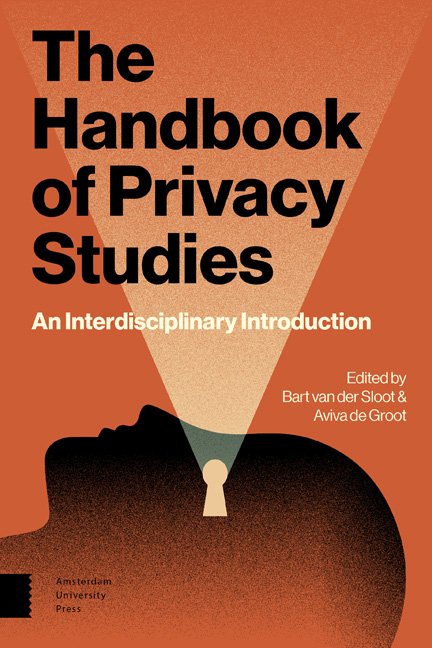Book contents
- Frontmatter
- Contents
- Introduction
- 1 Privacy from a Historical Perspective
- Legislating Privacy: Technology, Social Values, and Public Policy
- 2 Privacy from a Legal Perspective
- Three Dimensions of Privacy
- 3 Privacy from an Ethical Perspective
- Nudging: A Very Short Guide
- 4 Privacy from an Economic Perspective
- Security, Privacy, and the Internet of Things (IoT)
- 5 Privacy from an Informatics Perspective
- Political Science and Privacy
- 6 Privacy from an Intelligence Perspective
- A Privacy Doctrine for the Cyber Age
- 7 Privacy from an Archival Perspective
- Medical Privacy: Where Deontology and Consequentialism Meet
- 8 Privacy from a Medical Perspective
- Privacy Law – on the Books and on the Ground
- 9 Privacy from a Media Studies Perspective
- Diversity and Accountability in Data-Rich Markets
- 10 Privacy from a Communication Science Perspective
- Still Uneasy: a Life with Privacy
- 11 Privacy from an Anthropological Perspective
- About the Authors
6 - Privacy from an Intelligence Perspective
- Frontmatter
- Contents
- Introduction
- 1 Privacy from a Historical Perspective
- Legislating Privacy: Technology, Social Values, and Public Policy
- 2 Privacy from a Legal Perspective
- Three Dimensions of Privacy
- 3 Privacy from an Ethical Perspective
- Nudging: A Very Short Guide
- 4 Privacy from an Economic Perspective
- Security, Privacy, and the Internet of Things (IoT)
- 5 Privacy from an Informatics Perspective
- Political Science and Privacy
- 6 Privacy from an Intelligence Perspective
- A Privacy Doctrine for the Cyber Age
- 7 Privacy from an Archival Perspective
- Medical Privacy: Where Deontology and Consequentialism Meet
- 8 Privacy from a Medical Perspective
- Privacy Law – on the Books and on the Ground
- 9 Privacy from a Media Studies Perspective
- Diversity and Accountability in Data-Rich Markets
- 10 Privacy from a Communication Science Perspective
- Still Uneasy: a Life with Privacy
- 11 Privacy from an Anthropological Perspective
- About the Authors
Summary
Introduction
In 1974, the Rolling Stones released their song Fingerprint File. In this song Mick Jagger sings about the file the FBI created about him and states ‘these days it's all secrecy; no privacy’. Is this statement true? What is the relationship between privacy and the work of intelligence- and security services? Has this relationship changed over the years? The first section of this chapter will give an explanation about intelligence, intelligence gathering and the role of intelligence- and security services in the democratic legal order. The second section deals with the meaning and function of privacy in relation to intelligence. The third section focuses on the classic texts and authors and current dilemma's (for example accountability and oversight and big data and surveillance). Future challenges will be discussed in the fifth section. Because there will always be new threats, new modus operandi of the agencies as well as their opponents, and new ways of intelligence gathering. The sixth section offers some conclusions and an extensive list of literature. First, we will discuss some basics of intelligence studies.
What is intelligence?
There is an extensive debate within the discipline of intelligence studies about its exact definition. In the field of science, several authors differ of opinion whether intelligence only encompasses secret information or if it also contains information that is publicly available; is covert action also part of intelligence and should black propaganda or double-cross operations also be considered part of the definition?
Furthermore, the term and concept of intelligence is used in (academic) literature in a broad range of contexts. Sherman Kent made the distinction between: knowledge, organization type, and activities in 1949. Academic literature usually refers to the concept of intelligence within the context of the intelligence gathering process, occasionally it refers to the intelligence product itself or the intelligence organization.
Without losing ourselves in this debate, we could state that intelligence consists of the organized collection of both specific public and secret information, with the overall intention of supporting the executive branch in matters of national security. Intelligence commonly focuses on intentions and capabilities of adversaries that could potentially harm or disadvantage state and democracy.
- Type
- Chapter
- Information
- Handbook of Privacy StudiesAn Interdisciplinary Introduction, pp. 263 - 294Publisher: Amsterdam University PressPrint publication year: 2018

